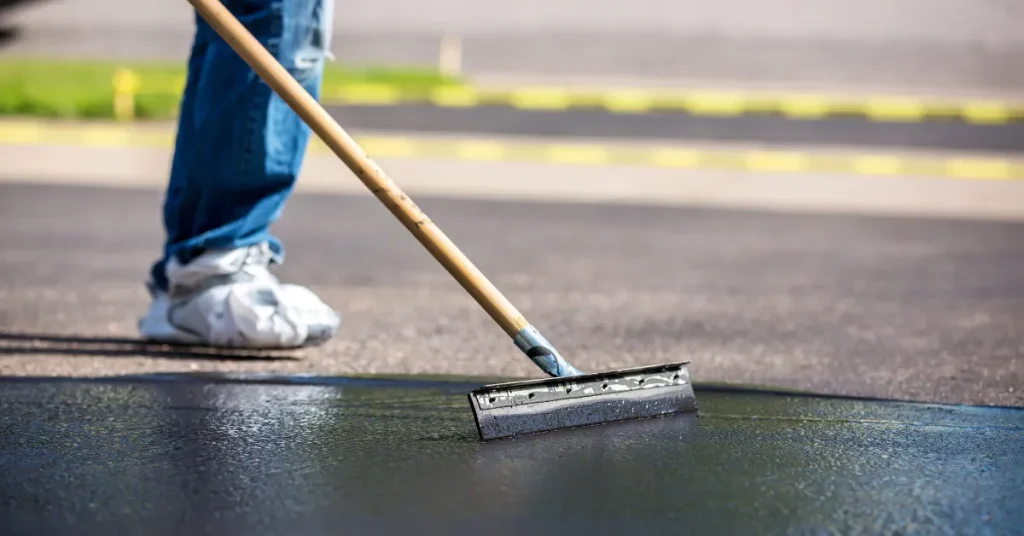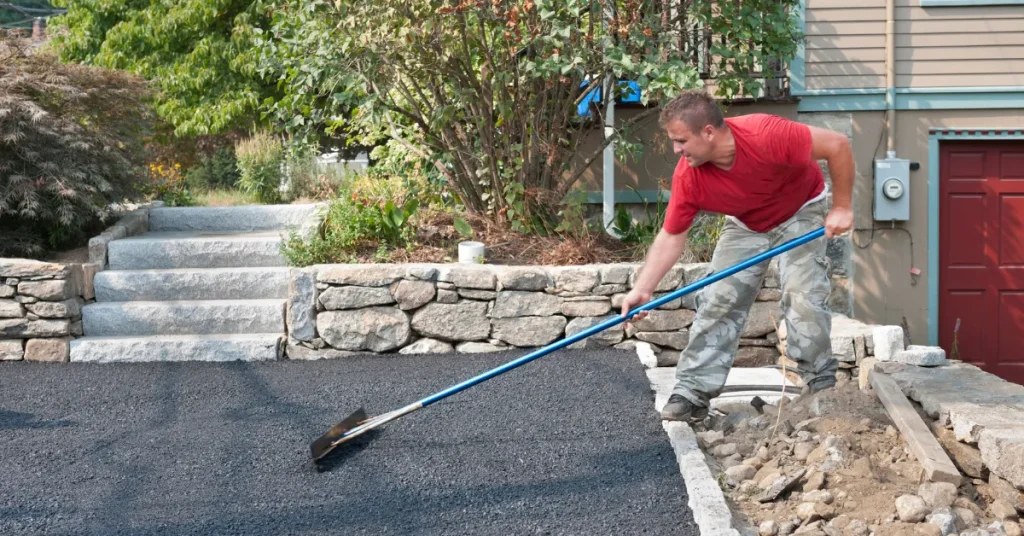An asphalt driveway should typically be 3 to 5 inches thick. Residential driveways usually require at least 3 inches of compacted asphalt.
A properly installed and maintained asphalt driveway offers durability and curb appeal, making it a popular choice among homeowners.
Understanding the ideal thickness is vital for longevity and performance. Thickness directly influences the driveway’s ability to withstand the weight of vehicles and the harsh elements.
It’s essential for contractors and DIY enthusiasts to adhere to these standard measurements to ensure optimal stability and prevent premature cracking or potholes.
Considering factors such as soil type, climate, and anticipated load will guide the necessary thickness for a solid, long-lasting asphalt driveway.
Making the right choice from the start means less maintenance and more satisfaction with your investment.

The Importance Of Asphalt Thickness
Think of your driveway as a sturdy table. Just like thick table legs support a heavy top, the right asphalt thickness can hold the weight of cars and harsh weather.
Too thin, and it might crack or sink. Picking the perfect thickness for your asphalt driveway is key for a smooth ride home.
Key Factors Influencing Driveway Longevity
Every driveway tells a story of the cars it carries and the feet that walk over it. How long it lasts depends on a few things:
- The weight of vehicles: Heavier cars need a stronger base.
- Weathers: In cold places, thicker asphalt survives better.
- Soil type: Some soils need more support from the asphalt.
- Usage: Busy driveways wear out sooner.
Consider all these to make sure your driveway stays tough for years.
Relationship Between Thickness And Durability
A thick driveway is like a good pair of shoes – it protects your home’s curb appeal and structure:
| Thickness | Benefits |
| 2.5 to 3 inches | Good for walking and biking. Lasts fairly long. |
| 3 to 5 inches | Best for most homes. Handles cars well. |
| 5 inches and up | For heavy use. Great for vans and trucks. |
More thickness means your driveway can take more hit and stick around longer. Like a sturdy umbrella in a storm, it stands strong against the troubles of time and traffic.
Thickness Standards For Residential Driveways
Choosing the right asphalt thickness for a driveway is vital. It ensures durability, stability, and optimal performance. Let’s discuss what standards suggest for residential driveways.
Industry Guidelines For Home Installations
Professionals often follow strict industry guidelines to determine driveway thickness.
- Base layer should be 4 to 8 inches of aggregate.
- Asphalt layer typically spans 2 to 3 inches after compaction.
- High traffic areas may require additional thickness.
Professional assessments consider ground stability and usage patterns. This impacts the final recommendation.
Regional Variations In Asphalt Depth Recommendations
Location impacts asphalt needs. Climate and soil conditions play a role.
| Region | Recommended Thickness |
| Colder climates | Up to 5 inches |
| Milder regions | Standard 2 to 3 inches |
Frozen ground requires thicker asphalt to prevent cracking. Softer soil might need a stronger aggregate base. Always check local codes for specific depth requirements.
Calculating The Ideal Asphalt Depth For Your Driveway
The thickness of your asphalt driveway is critical to its longevity and performance. Too thin, and it’s prone to cracking under the weight of vehicles; too thick, and you may be unnecessarily driving up the cost.
To ensure a durable surface, consider the following factors when determining the ideal asphalt depth for your driveway.
Assessing Load And Usage
Underestimate the importance of usage patterns at your peril. Frequent heavy loads demand robustness. Here’s a simple guide:
- Light use, such as bikes and small cars, requires at least 3 inches of asphalt.
- Medium use, with small trucks or regular car usage, should have 4 inches.
- Heavy use, think large trucks or RVs, merits at least 5 inches of asphalt.
Soil Type And Environmental Considerations
Soil type beneath the asphalt drastically affects its required thickness. Gravel bases work best with 4 inches of asphalt, whereas clay-based soils often need a stronger, thicker layer, around 5 to 6 inches.
Moreover, weather plays its part; freeze-thaw cycles necessitate a thicker layer to combat expanding and contracting soil. Use this checklist to ensure the right depth:
- Determine the soil type: sandy, gravelly, or clay.
- Consider the climate: mild, extreme cold, or wet.
- Adjust the thickness accordingly to mitigate potential damage.
Subgrade And Foundation Essentials

Understanding the subgrade and foundation essentials is critical when installing an asphalt driveway. The driveway’s durability and strength depend on a well-prepared foundation.
An ideal thickness ensures a long-lasting and resilient surface. The subgrade and base layer play pivotal roles in supporting the asphalt and providing a stable platform for vehicles.
The Role Of The Subgrade In Supporting Asphalt
The subgrade acts as the backbone for your asphalt driveway. It’s the natural soil upon which everything else sits. If the subgrade is firm and well-compacted, it dramatically improves the driveway’s lifespan.
For optimal support, the soil should be free from organic material and moisture content should be controlled. The steps to fortify the subgrade include:
- Removing topsoil and vegetative elements.
- Leveling and compacting the soil to prevent future settling and cracks.
- Adjusting the soil’s moisture content for optimum compaction.
Best Practices For Base Layer Construction
The base layer, layered on top of the subgrade, provides extra support to the asphalt. It’s often made from crushed stone or gravel. The right materials and compaction methods are crucial for a strong base. The following practices should guide the construction:
- Choosing high-quality materials that provide stability and drainage.
- Ensuring the base is thick enough to bear the traffic load—typically 4-6 inches for residential driveways.
- Compacting the base material in layers for maximum solidity.
- Using water to help with compaction, which ensures a solid, non-shifting base layer.
Installation Techniques To Ensure Proper Thickness
When paving an asphalt driveway, thickness is a critical factor for longevity. Getting the proper thickness depends on professional installation techniques. These methods not only support the asphalt but also help avoid future problems.
Let’s dive into how these techniques ensure a driveway that stands the test of time.
Selecting The Right Contractors
Finding seasoned contractors is the first step. Proper asphalt thickness starts with a skilled team. Insist on a contractor with:
- Proven experience in driveway installations
- Positive customer reviews and references
- Certifications to showcase their expertise
Ensure they conduct a thorough site evaluation. This should include assessing soil conditions and drainage needs.
Quality Control Measures During Paving
During installation, quality control is paramount. The following measures should be in place:
- Use of high-grade asphalt mix for durability
- Application in multiple layers, each compacted properly
- Consistent monitoring of asphalt temperature
- Regular thickness checks during the paving process
Make sure the base is prepared correctly. It should be firm and well-compacted to support the asphalt.
| Driveway Use | Recommended Base Thickness | Recommended Asphalt Thickness |
| Light vehicles | 4-6 inches | 2-3 inches |
| Heavy vehicles | 6-8 inches | 3-5 inches |
Remember, the right base and asphalt layers ensure a long-lasting driveway.
Maintenance Tips To Preserve Optimal Driveway Thickness

An asphalt driveway needs proper care to maintain its integrity. A well-maintained surface endures the test of time and traffic. Below, discover key practices that will help you protect your driveway’s structure and thickness.
Seasonal Upkeep Strategies
Consistent maintenance across different seasons is vital. This ensures your driveway remains at its recommended thickness and performs well.
- Spring: Check for potholes and cracks. Seal them quickly.
- Summer: Apply sealant to protect from UV rays.
- Fall: Clean leaves and debris. It prevents moisture buildup.
- Winter: Use safe de-icing products. Avoid metal shovels to prevent scratches.
Dealing With Wear And Tear
Regular inspection spots signs of damage early. Quick actions keep the driveway’s thickness optimal.
- Fill cracks immediately to stop water infiltration.
- Reseal your surface every two to three years.
- Avoid heavy loads to prevent surface denting and underlying structural damage.
By following these steps, your asphalt driveway can stay strong and thick for years.
FAQs About How Thick Should An Asphalt Driveway Be
How Much Weight Can 2 Inches Of Asphalt Hold?
Two inches of asphalt can typically support vehicles up to 30,000 pounds, assuming it’s laid on a stable, compacted base. Larger vehicles require a thicker asphalt layer to avoid surface damage.
Can Asphalt Be Too Thick?
Yes, asphalt can be too thick, leading to improper compaction and reduced durability. Optimal thickness ensures a stable, long-lasting surface.
Is 1.5 Inches Of Asphalt Enough For A Driveway?
No, 1. 5 inches of asphalt is not typically enough for a driveway. Driveways generally require at least 2 to 3 inches of asphalt for durability and proper support.
What Is The Minimum Thickness For Asphalt?
The minimum thickness for a standard asphalt overlay is 1. 5 inches. For a full-depth asphalt pavement, it generally ranges from 3 to 5 inches.
Conclusion
Selecting the proper thickness for your asphalt driveway is crucial. Aim for 3-5 inches, considering usage and soil type. Proper installation and maintenance can extend longevity.
Remember, a smooth, durable driveway is an investment, adding beauty and value to your property.
Choose wisely and drive with confidence.
Resources:
1.https://www.fhwa.dot.gov/publications/research/infrastructure/pavements/asphalt/HMA.pdf
